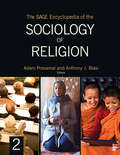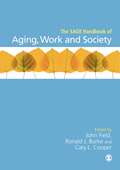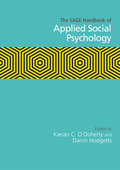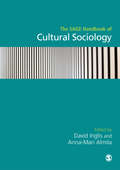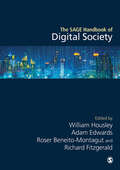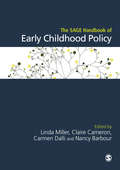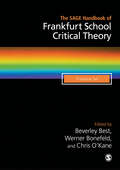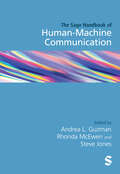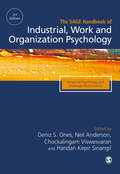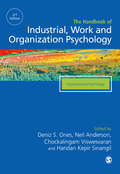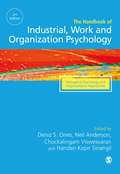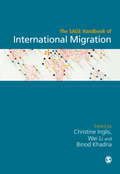- Table View
- List View
The SAGE Encyclopedia of the Sociology of Religion
by Adam Possamai Anthony J. BlasiThe SAGE Encyclopedia of the Sociology of Religion takes a three-pronged look at this, namely investigating the role of religion in society; unpacking and evaluating the significance of religion in and on human history; and tracing and outlining the social forces and influences that shape religion. This encyclopedia covers a range of themes from: • fundamental topics like definitions • secularization • dimensions of religiosity to such emerging issues as civil religion • new religious movements This Encyclopedia also addresses contemporary dilemmas such as fundamentalism and extremism and the role of gender in religion.
The SAGE Encyclopedia of the Sociology of Religion
by Adam Possamai Anthony J. BlasiThe SAGE Encyclopedia of the Sociology of Religion takes a three-pronged look at this, namely investigating the role of religion in society; unpacking and evaluating the significance of religion in and on human history; and tracing and outlining the social forces and influences that shape religion. This encyclopedia covers a range of themes from: • fundamental topics like definitions • secularization • dimensions of religiosity to such emerging issues as civil religion • new religious movements This Encyclopedia also addresses contemporary dilemmas such as fundamentalism and extremism and the role of gender in religion.
The SAGE Handbook of Aging, Work and Society (Sage Handbooks Ser.)
by John Field Professor Ronald J Burke Professor Cary L CooperAging has emerged as a major and urgent issue for individuals, organisations and governments of our time. In this well-timed and comprehensive handbook, key international contributors to the field of study come together to create a definitive map of the subject. Framed by an authoritative introductory chapter, the SAGE Handbook of Aging, Work and Society offers a critical overview of the most significant themes and topics, with discussions of current research, theoretical controversies and emerging issues, divided into sections covering: Key Issues and Challenges The Aging Workforce Managing an Aging Workforce Living in an Aging Society Developing Public Policy
The SAGE Handbook of Applied Social Psychology
by Darrin Hodgetts Kieran C. O'DohertyIn the present epoch of global change, movement, interconnection and the intensification of social issues within and across many societies, applied social psychology is more relevant than ever. The SAGE Handbook of Applied Social Psychology offers an overview of the field and the disparate and evolving approaches. Through an international team of contributors, the handbook brings prominent research literature together and organises it around ten key areas: Part 01: Culture, race, indigeneity Part 02: Gender & Sexuality Part 03: Politics Part 04: Health and mental health Part 05: Work Part 06: Ageing Part 07: Communication Part 08: Education Part 09: Environment Part 10: Criminal Justice, Law, & Crime This handbook is a uniting and invigorating resource for the field of Applied Social Psychology.
The SAGE Handbook of Applied Social Psychology
by Darrin Hodgetts Kieran C. O'DohertyIn the present epoch of global change, movement, interconnection and the intensification of social issues within and across many societies, applied social psychology is more relevant than ever. The SAGE Handbook of Applied Social Psychology offers an overview of the field and the disparate and evolving approaches. Through an international team of contributors, the handbook brings prominent research literature together and organises it around ten key areas: Part 01: Culture, race, indigeneity Part 02: Gender & Sexuality Part 03: Politics Part 04: Health and mental health Part 05: Work Part 06: Ageing Part 07: Communication Part 08: Education Part 09: Environment Part 10: Criminal Justice, Law, & Crime This handbook is a uniting and invigorating resource for the field of Applied Social Psychology.
The SAGE Handbook of Consumer Culture
by Steven Miles Pauline Maclaran Olga Kravets Professor Alladi VenkateshThe question of consumption emerged as a major focus of research and scholarship in the 1990s but the breadth and diversity of consumer culture has not been fully enough explored. The meanings of consumption, particularly in relation to lifestyle and identity, are of great importance to academic areas including business studies, sociology, cultural and media studies, psychology, geography and politics. The SAGE Handbook of Consumer Culture is a one-stop resource for scholars and students of consumption, where the key dimensions of consumer culture are critically discussed and articulated. The editors have organised contributions from a global and interdisciplinary team of scholars into six key sections: Part 1: Sociology of Consumption Part 2: Geographies of Consumer Culture Part 3: Consumer Culture Studies in Marketing Part 4: Consumer Culture in Media and Cultural Studies Part 5: Material Cultures of Consumption Part 6: The Politics of Consumer Culture
The SAGE Handbook of Consumer Culture
by Steven Miles Pauline Maclaran Olga Kravets Professor Alladi VenkateshThe question of consumption emerged as a major focus of research and scholarship in the 1990s but the breadth and diversity of consumer culture has not been fully enough explored. The meanings of consumption, particularly in relation to lifestyle and identity, are of great importance to academic areas including business studies, sociology, cultural and media studies, psychology, geography and politics. The SAGE Handbook of Consumer Culture is a one-stop resource for scholars and students of consumption, where the key dimensions of consumer culture are critically discussed and articulated. The editors have organised contributions from a global and interdisciplinary team of scholars into six key sections: Part 1: Sociology of Consumption Part 2: Geographies of Consumer Culture Part 3: Consumer Culture Studies in Marketing Part 4: Consumer Culture in Media and Cultural Studies Part 5: Material Cultures of Consumption Part 6: The Politics of Consumer Culture
The SAGE Handbook of Cultural Sociology
by David Inglis Anna-Mari AlmilaCultural sociology - or the sociology of culture - has grown from a minority interest in the 1970s to become one of the largest and most vibrant areas within sociology globally. In The SAGE Handbook of Cultural Sociology, a global range of experts explore the theory, methodology and innovations that make up this ever-expanding field. The Handbook's 40 original chapters have been organised into five thematic sections: Theoretical Paradigms Major Methodological Perspectives Domains of Inquiry Cultural Sociology in Contexts Cultural Sociology and Other Analytical Approaches Both comprehensive and current, The SAGE Handbook of Cultural Sociology will be an essential reference tool for both advanced students and scholars across sociology, cultural studies and media studies.
The SAGE Handbook of Cultural Sociology
by David Inglis Anna-Mari AlmilaCultural sociology - or the sociology of culture - has grown from a minority interest in the 1970s to become one of the largest and most vibrant areas within sociology globally. In The SAGE Handbook of Cultural Sociology, a global range of experts explore the theory, methodology and innovations that make up this ever-expanding field. The Handbook's 40 original chapters have been organised into five thematic sections: Theoretical Paradigms Major Methodological Perspectives Domains of Inquiry Cultural Sociology in Contexts Cultural Sociology and Other Analytical Approaches Both comprehensive and current, The SAGE Handbook of Cultural Sociology will be an essential reference tool for both advanced students and scholars across sociology, cultural studies and media studies.
The SAGE Handbook of Digital Society
by William Housley Richard Fitzgerald Adam Edwards Roser Beneito-MontagutThis SAGE Handbook brings together cutting edge social scientific research and theoretical insight into the emerging contours of digital society. Chapters explore the relationship between digitisation, social organisation and social transformation at both the macro and micro level, making this a valuable resource for postgraduate students and academics conducting research across the social sciences. The topics covered are impressively far-ranging and timely, including machine learning, social media, surveillance, misinformation, digital labour, and beyond. This innovative Handbook perfectly captures the state of the art of a field which is rapidly gaining cross-disciplinary interest and global importance, and establishes a thematic framework for future teaching and research. Part 1: Theorising Digital Societies Part 2: Researching Digital Societies Part 3: Sociotechnical Systems and Disruptive Technologies in Action Part 4: Digital Society and New Social Dilemmas Part 5: Governance and Regulation Part 6: Digital Futures
The SAGE Handbook of Digital Society
by William Housley Richard Fitzgerald Adam Edwards Roser Beneito-MontagutThis SAGE Handbook brings together cutting edge social scientific research and theoretical insight into the emerging contours of digital society. Chapters explore the relationship between digitisation, social organisation and social transformation at both the macro and micro level, making this a valuable resource for postgraduate students and academics conducting research across the social sciences. The topics covered are impressively far-ranging and timely, including machine learning, social media, surveillance, misinformation, digital labour, and beyond. This innovative Handbook perfectly captures the state of the art of a field which is rapidly gaining cross-disciplinary interest and global importance, and establishes a thematic framework for future teaching and research. Part 1: Theorising Digital Societies Part 2: Researching Digital Societies Part 3: Sociotechnical Systems and Disruptive Technologies in Action Part 4: Digital Society and New Social Dilemmas Part 5: Governance and Regulation Part 6: Digital Futures
The SAGE Handbook of Early Childhood Policy
by Linda Miller Professor Claire Cameron Professor Carmen Dalli Nancy BarbourRecent authoritative evidence suggests that an estimated 200 million children under five fail to achieve their developmental potential due to factors including poor health and nutrition and the lack of stable high quality care. A significant number of the world’s children today lack the basic rights to health, development and protection. In light of such statistics, early childhood services for young children have expanded around the world. The SAGE Handbook of Early Childhood Policy draws critical attention to policy in Early Childhood Education and Care (ECEC) its relationship to service provision and its impact on the lives of children and families. The perspectives of leading academics and researchers from Europe, North America, South America, Africa, Australasia and Asia have been arranged around five key themes: Part 1: The Relationship Between Research, Policy And Practice: Country Case Studies Part 2: Equitable Early Childhood Services: Intervention to Improve Children’s Life Chances Part 3: Extending Practice: The Role of Early Childhood Services In Family Support Part 4: Participation, Rights and Diversity Part 5: Future Directions for Early Childhood Policy This handbook is essential reading for practitioners, stakeholders and others committed to working within early years services to achieve an awareness of policy and its implications for services and practice.
The SAGE Handbook of Early Childhood Policy
by Linda Miller Professor Claire Cameron Professor Carmen Dalli Nancy BarbourRecent authoritative evidence suggests that an estimated 200 million children under five fail to achieve their developmental potential due to factors including poor health and nutrition and the lack of stable high quality care. A significant number of the world’s children today lack the basic rights to health, development and protection. In light of such statistics, early childhood services for young children have expanded around the world. The SAGE Handbook of Early Childhood Policy draws critical attention to policy in Early Childhood Education and Care (ECEC) its relationship to service provision and its impact on the lives of children and families. The perspectives of leading academics and researchers from Europe, North America, South America, Africa, Australasia and Asia have been arranged around five key themes: Part 1: The Relationship Between Research, Policy And Practice: Country Case Studies Part 2: Equitable Early Childhood Services: Intervention to Improve Children’s Life Chances Part 3: Extending Practice: The Role of Early Childhood Services In Family Support Part 4: Participation, Rights and Diversity Part 5: Future Directions for Early Childhood Policy This handbook is essential reading for practitioners, stakeholders and others committed to working within early years services to achieve an awareness of policy and its implications for services and practice.
The SAGE Handbook of Frankfurt School Critical Theory
by Werner Bonefeld Beverley Best Chris O'KaneThe SAGE Handbook of Frankfurt School Critical Theory expounds the development of critical theory from its founding thinkers to its contemporary formulations in an interdisciplinary setting. It maps the terrain of a critical social theory, expounding its distinctive character vis-a-vis alternative theoretical perspectives, exploring its theoretical foundations and developments, conceptualising its subject matters both past and present, and signalling its possible future in a time of great uncertainty. Taking a distinctively theoretical, interdisciplinary, international and contemporary perspective on the topic, this wide-ranging collection of chapters is arranged thematically over three volumes: Volume I: Key Texts and Contributions to a Critical Theory of Society Volume II: Themes Volume III: Contexts This Handbook is essential reading for scholars and students in the field, showcasing the scholarly rigor, intellectual acuteness and negative force of critical social theory, past and present.
The SAGE Handbook of Frankfurt School Critical Theory
by Werner Bonefeld Beverley Best Chris O'KaneThe SAGE Handbook of Frankfurt School Critical Theory expounds the development of critical theory from its founding thinkers to its contemporary formulations in an interdisciplinary setting. It maps the terrain of a critical social theory, expounding its distinctive character vis-a-vis alternative theoretical perspectives, exploring its theoretical foundations and developments, conceptualising its subject matters both past and present, and signalling its possible future in a time of great uncertainty. Taking a distinctively theoretical, interdisciplinary, international and contemporary perspective on the topic, this wide-ranging collection of chapters is arranged thematically over three volumes: Volume I: Key Texts and Contributions to a Critical Theory of Society Volume II: Themes Volume III: Contexts This Handbook is essential reading for scholars and students in the field, showcasing the scholarly rigor, intellectual acuteness and negative force of critical social theory, past and present.
The SAGE Handbook of Human–Machine Communication
by Steve Jones Rhonda McEwen Andrea L. GuzmanThe SAGE Handbook of Human-Machine Communication has been designed to serve as the touchstone text for researchers and scholars engaging in new research in this fast-developing field. Chapters provide a comprehensive grounding of the history, methods, debates and theories that contribute to the study of human-machine communication. Further to this, the Handbook provides a point of departure for theorizing interactions between people and technologies that are functioning in the role of communicators, and for considering the theoretical and methodological implications of machines performing traditionally ‘human’ roles. This makes the Handbook the first of its kind, and a valuable resource for students and scholars across areas such as communication, media and information studies, and computer science, as well as for practitioners, engineers and researchers interested in the foundational elements of this emerging field. Part 1: Histories and Trajectories Part 2: Approaches and Methods Part 3: Concepts and Contexts Part 4: Technologies and Applications
The SAGE Handbook of Human–Machine Communication
by Steve Jones Rhonda McEwen Andrea L. GuzmanThe SAGE Handbook of Human-Machine Communication has been designed to serve as the touchstone text for researchers and scholars engaging in new research in this fast-developing field. Chapters provide a comprehensive grounding of the history, methods, debates and theories that contribute to the study of human-machine communication. Further to this, the Handbook provides a point of departure for theorizing interactions between people and technologies that are functioning in the role of communicators, and for considering the theoretical and methodological implications of machines performing traditionally ‘human’ roles. This makes the Handbook the first of its kind, and a valuable resource for students and scholars across areas such as communication, media and information studies, and computer science, as well as for practitioners, engineers and researchers interested in the foundational elements of this emerging field. Part 1: Histories and Trajectories Part 2: Approaches and Methods Part 3: Concepts and Contexts Part 4: Technologies and Applications
The SAGE Handbook of Industrial, Work & Organizational Psychology: V1: Personnel Psychology and Employee Performance
by Neil Anderson Deniz S Ones Dr Chockalingam Viswesvaran Handan Kepir SinangilThe first volume in The SAGE Handbook of Industrial, Organizational and Work Psychology introduces key concepts in personnel and employee performance from cognitive ability and the psychological predictors used in assessments to employee and team values. The editor and contributors present a clear overview of key research in the areas of behaviour change and how to assess individual job performance – making Volume I indispensable for anyone working in or studying Human Resource Management.
The SAGE Handbook of Industrial, Work & Organizational Psychology: V1: Personnel Psychology and Employee Performance
by Neil Anderson Deniz S Ones Dr Chockalingam Viswesvaran Handan Kepir SinangilThe first volume in The SAGE Handbook of Industrial, Organizational and Work Psychology introduces key concepts in personnel and employee performance from cognitive ability and the psychological predictors used in assessments to employee and team values. The editor and contributors present a clear overview of key research in the areas of behaviour change and how to assess individual job performance – making Volume I indispensable for anyone working in or studying Human Resource Management.
The SAGE Handbook of Industrial, Work & Organizational Psychology: V2: Organizational Psychology
by Neil Anderson Deniz S Ones Dr Chockalingam Viswesvaran Handan Kepir SinangilThe second volume in the SAGE Handbook of Industrial, Organizational and Work Psychology looks in detail at how teams and individuals function and perform. It covers motivation and organizational socialisation as well as the latest research into diversity and organizational culture in the workplace. There are also sections on social networks and how job loss and the experience of unemployment can affect individuals and wider groups within organizations. Part One: Lenses Part Two: Social and Political Order Part Three: Legacies Part Four: Problems and Problematics
The SAGE Handbook of Industrial, Work & Organizational Psychology: V2: Organizational Psychology
by Neil Anderson Deniz S Ones Dr Chockalingam Viswesvaran Handan Kepir SinangilThe second volume in the SAGE Handbook of Industrial, Organizational and Work Psychology looks in detail at how teams and individuals function and perform. It covers motivation and organizational socialisation as well as the latest research into diversity and organizational culture in the workplace. There are also sections on social networks and how job loss and the experience of unemployment can affect individuals and wider groups within organizations. Part One: Lenses Part Two: Social and Political Order Part Three: Legacies Part Four: Problems and Problematics
The SAGE Handbook of Industrial, Work & Organizational Psychology: V3: Managerial Psychology and Organizational Approaches
by Neil Anderson Deniz S Ones Dr Chockalingam Viswesvaran Handan Kepir SinangilThe third volume in The SAGE Handbook of Industrial, Organizational and Work Psychology concentrates on business decision-making and the many factors influencing the adoption and implementation of IWO practices. Chapter topics include utility assessments of interventions, decision-making errors in IWO systems, large-scale interventions and best practices reviews. Volume Three offers a comprehensive overview of the field for anyone working in or studying managerial or organizational psychology.
The SAGE Handbook of Industrial, Work & Organizational Psychology: V3: Managerial Psychology and Organizational Approaches
by Neil Anderson Deniz S Ones Dr Chockalingam Viswesvaran Handan Kepir SinangilThe third volume in The SAGE Handbook of Industrial, Organizational and Work Psychology concentrates on business decision-making and the many factors influencing the adoption and implementation of IWO practices. Chapter topics include utility assessments of interventions, decision-making errors in IWO systems, large-scale interventions and best practices reviews. Volume Three offers a comprehensive overview of the field for anyone working in or studying managerial or organizational psychology.
The SAGE Handbook of International Migration
by Wei Li Binod Khadria Christine InglisThe SAGE Handbook of International Migration provides an authoritative and informed analysis of key issues in international migration, including its crucial significance far beyond the more traditional questions of immigrant settlement and incorporation in particular countries. Bringing together chapters contributed by an international cast of leading voices in the field, the Handbook is arranged around four key thematic parts: Part 1: Disciplinary Perspectives on Migration Part 2: Historical and Contemporary Flows of Migrants Part 3: Theory, Policy and the Factors Affecting Incorporation Part 4: National and Global Policy Challenges in Migration The last three decades have seen the rapid increase and diversification in the types of international migration, and this Handbook has been created to meet the need among academics and researchers across the social sciences, policy makers and commentators for a definitive publication which provides a range of perspectives and insights into key themes and debates in the field.
The SAGE Handbook of International Migration
by Wei Li Binod Khadria Christine InglisThe SAGE Handbook of International Migration provides an authoritative and informed analysis of key issues in international migration, including its crucial significance far beyond the more traditional questions of immigrant settlement and incorporation in particular countries. Bringing together chapters contributed by an international cast of leading voices in the field, the Handbook is arranged around four key thematic parts: Part 1: Disciplinary Perspectives on Migration Part 2: Historical and Contemporary Flows of Migrants Part 3: Theory, Policy and the Factors Affecting Incorporation Part 4: National and Global Policy Challenges in Migration The last three decades have seen the rapid increase and diversification in the types of international migration, and this Handbook has been created to meet the need among academics and researchers across the social sciences, policy makers and commentators for a definitive publication which provides a range of perspectives and insights into key themes and debates in the field.
